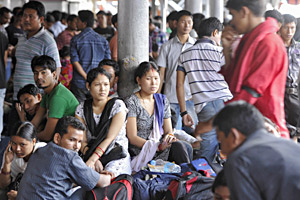
New Delhi, August 20: Stepping up its drive against “erring” portals, the government has ordered blocking of more than 250 websites in which morphed images and videos were uploaded to incite Muslims leading to exodus of people belonging to the North East from Karnataka and some other states.
Home ministry officials said more than 130 websites have been blocked till now while the rest will be blocked shortly.
“We are planning to block some more sites,” an official said.
The government is also contemplating to take up the CERT-In (Computer Emergency Response Team-India) findings at the international forum as it has turned out to be the biggest instance of cyber warfare on India in recent times.
A Pakistan-based hardline group is suspected to have been involved in doctoring images and spreading them across social networking sites like Facebook, Twitter and You Tube to incite Muslims and create scare among people of North Eastern region living across India.
Most of the online content started getting posted from July 13 and fake profiles were created for spreading morphed pictures, according to a Home Ministry report prepared in the wake of mass exodus of people belonging to the North East from Bangalore, Pune, Chennai and Mumbai following rumours about possible attack on them.







Comments
Add new comment